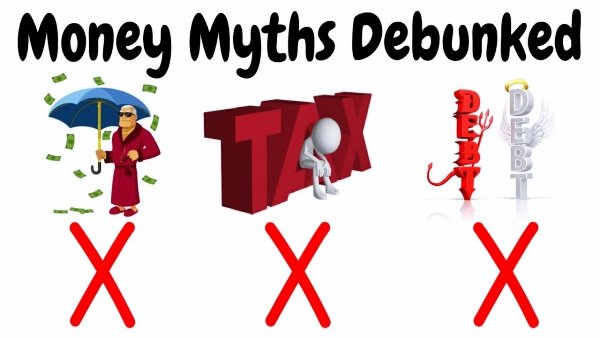Debunking Money Myths can be overwhelming, and sometimes the loudest voices aren’t the most reliable. Money myths can hold you back from reaching your financial goals. Let’s debunk some common myths and set the record straight.
Read more: Debunking Money Myths: Separating Fact From Fiction In The Financial World
Debunking Money Myths Meaning
“Debunking Money Myths” means exposing and clearing up false beliefs about money. These myths can be misleading and prevent you from making smart financial decisions.
This blog post dives into common money myths and explains why they aren’t true. For example, the myth that you need to be born rich to get rich is debunked by highlighting the importance of hard work, saving, and investing.
Related: ESG Investing: Understanding Environmental, Social, and Governance Factors

Personal Finance Myths
Personal finance myths are commonly held but incorrect assumptions about money and finances. These falsehoods can spread via word of mouth, social media, or even well-meaning friends and relatives. They can be harmful since they can lead to poor financial decisions that prevent you from meeting your financial objectives.
Some of the most popular personal finance myths:
- You Must Be Born Rich to Get Rich: This misconception stops people from taking control of their finances. The truth is that many successful people amassed their fortune by hard labor, prudent saving, and strategic investments.
- Not all debt is bad: Debt can be a beneficial tool, particularly for mortgages and school loans, which can help you reach long-term goals. The trick is to handle debt properly, which includes prioritizing high-interest debt and devising a repayment strategy.
- Saving More Is Always Better Than Investing: While saving is important for emergencies and short-term goals, inflation can diminish the value of your savings over time. Investing permits your money to increase at a quicker rate than inflation. Depending on your risk tolerance and goals, you should strike a balance between saving and investing.
- Owning a Home is Always a Good Investment: While homeownership can be rewarding, it is not a guaranteed source of income. Consider things like maintenance expenses, property taxes, and the housing market.
- Money doesn’t grow on trees, and you can’t get rich quick: There are no shortcuts to money. Sustainable financial success necessitates patience, discipline, and measured risks. Avoid get-rich-quick schemes and instead focus on long-term solutions such as investing and increasing your income.
Debunking these myths and educating yourself will allow you to make informed financial decisions and take control of your financial destiny.
Related: Automate Your Finances: Leverage Technology to Simplify Money Management

Financial Literacy Myths
Myths regarding financial literacy are commonplace false beliefs about financial products and money management. These misconceptions may keep you from achieving your financial objectives and from making wise financial decisions. Among the most prevalent myths about financial literacy are:
- Is Financial Literacy Exclusively for the Wealthy? No, financial literacy is for everyone, no matter how much money they make. It’s about knowing how to prepare for your financial future, make wise decisions, and efficiently manage your money.
- If your income is sufficient, you don’t need a budget: Overspending and lifestyle inflation can affect even wealthy people. Budgeting enables you to keep tabs on your earnings and outlays, spot places for savings, and set aside money for your objectives.
- Investing is Only for the Stock Market: There are many investment options beyond the stock market, such as mutual funds, bonds, and real estate. It’s important to choose investments that align with your risk tolerance and financial goals.
- Credit Cards Are Always Bad: Credit cards can be a valuable tool for building credit, earning rewards, and making purchases. However, responsible use is key. Pay your balance in full each month to avoid high interest charges.
- Insurance is a Waste of Money: Insurance provides financial protection in case of unexpected events. While it may seem like a cost upfront, it can save you a significant amount of money down the line in case of an accident, illness, or property damage.
- I Can Time the Stock Market: Attempting to time the market carries a high level of risk and is not always successful. Investing in the long run and concentrating on a diverse portfolio is a better strategy.
- Retirement Savings Can Wait: Compound interest’s strength makes getting a head start on retirement savings crucial. Over time, even little sums that are persistently saved can add up.
Numerous tools are at your disposal to enhance your financial literacy, including books, online courses, and workshops provided by banks or credit unions. By dispelling these financial literacy fallacies and gaining knowledge, you will be able to make wise financial decisions and reach your financial objectives. Never be reluctant to ask questions and, if necessary, seek the expert counsel of a financial advisor.
Related: International Education Trends: Adapting To A Changing World

Myths Debunked
The world of finance is full of information, and sometimes it can be hard to tell what’s true and what’s simply a myth. These myths can hold you back from reaching your financial goals. Let’s debunk some common ones.
Myth Busters:
You Need to Be Born Rich to Get Rich
- This is a big one. While inheritance can be a head start, many successful people build their wealth through hard work, smart saving, and calculated investments.
- Focus on what you can control: your spending habits, income streams, and how you invest your money.
All Debt is Bad Debt
- Debt can be a tool. Mortgages and student loans can help you achieve long-term goals like homeownership or education. The key is managing debt responsibly. Prioritize high-interest debt and have a plan to pay it down. Responsible use of credit cards can even help build your credit score, which unlocks better interest rates in the future.
Saving More is Always Better Than Investing
- Saving is essential for emergencies and short-term goals. But inflation can erode the value of your saved cash over time. Investing allows your money to grow potentially faster than inflation. It’s about finding a balance between saving and investing based on your risk tolerance and financial goals.
Owning a Home is Always a Good Investment
- Homeownership offers many benefits, but it’s not a guaranteed moneymaker. Consider factors like maintenance costs, property taxes, and market fluctuations. Sometimes, renting might be a better financial decision, especially if you don’t plan to stay in one place long-term.
Get Rich Quick Schemes Work
- There’s no magic bullet to wealth. Sustainable financial success takes time, discipline, and calculated risks. Avoid get-rich-quick schemes and focus on long-term strategies like investing and building your income.
Empower Yourself
- Financial literacy empowers you to make informed decisions. Do your research, consult with financial advisors if needed, and don’t be afraid to ask questions. By debunking these myths, you can take charge of your financial future and build a secure path to your goals.
Related: Snowball vs. Avalanche Method – Which is Right for You?

Financial Myths Young Adults Fall For
Although it’s a period of exciting new beginnings, young adulthood may also be difficult in terms of finances. Financial fallacies are easy to believe when you have school loans, rent, and that new phone that’s so alluring. Let’s dispel some myths that young adults frequently believe to set you straight.
A college degree guarantees success right away
- While valuable, education does not ensure financial success. Depending on your job ambitions, focus on acquiring in-demand skills and take into account other options like trade schools or certificates.
When it comes to receiving free travel points, credit cards are evil.
There are two sides to credit cards. While prudent use contributes to credit building, going over your limit results in high-interest debt. Use credit cards only for purchases that you can afford.
You Can Put Off Saving for Later.
- Compound interest truly has power. When you start saving early and start small, your money will rise dramatically over time. A mere $20 weekly accumulates.
Making a budget is tedious (and restrictive).
- Making a budget is about taking charge, not about hardship. Using a budget enables you to keep tabs on your earnings and outgoings, pinpoint areas for savings, and make wise purchasing choices. To make budgeting enjoyable and simple, there are a ton of tools and apps available.
Investing is Too Risky and Complicated for Novices
- Investing need not be frightening. Beginners can choose from a variety of inexpensive investment options, such as index funds. Do your homework, start small, and think about getting expert financial guidance if necessary.
Financial Literacy Begins Now.
Debunking these beliefs and taking control of your finances early will put you on track for a safe and happy future. Remember that financial literacy is a journey, not a destination. There are numerous resources available to assist you manage the financial world, including those found online, through your bank, and from financial experts. Do not be scared to ask questions and continue studying.
Related: Sustainable Spending: Making Eco-Friendly Choices That Save You Money

Misconceptions About Money
Some common misconceptions about money include:
Earning Potential:
- You Need a High-Paying Job to Get Rich: While a high income can accelerate wealth building, it’s not the only factor. Smart budgeting, wise investing, and living below your means can help you achieve financial goals even on a modest salary.
- There’s Only One Path to Financial Success: There are many roads to financial security. Entrepreneurship, freelancing, or side hustles can be lucrative options for some, while others may find success through traditional careers with steady paychecks.
Debt and Spending:
- Not all debt is bad: When handled responsibly, such as with mortgages or student loans for education, debt can help you acquire assets and grow wealth over time. The goal is to handle debt responsibly and avoid high-interest borrowing.
- Keeping up with the Joneses is important. Trying to keep up with your peers’ lifestyle when you can’t afford it is a recipe for financial hardship. Focus on your financial objectives and avoid spontaneous spending to please others.
Saving and Investing:
- Saving Alone is Enough: Saving is crucial for emergencies and short-term goals, but inflation erodes the purchasing power of saved cash over time. Investing allows your money to grow potentially faster than inflation.
- Investing is Only for the Rich: Every budget has investment options, including low-cost index funds. You don’t need a large sum of money to start investing.
Mindset and Habits:
- Money Can Buy Happiness: While financial security can alleviate stress, true happiness stems from deeper sources such as relationships, purpose, and personal fulfillment. Aim for a balanced approach in which money helps you live your preferred lifestyle but does not become the primary emphasis.
- Financial success is not just about luck but also hard effort, discipline, and making sound decisions. Educate yourself on personal finance, handle your money carefully, and prioritize long-term wealth accumulation.
Understanding these misunderstandings can allow you to make more educated financial decisions and take control of your financial destiny.
Related: Financial Goals: Tips To Boost Your Bank Account

Separating Fact From Fiction In The Financial World
The world of finance can be confusing and filled with complex terms and conflicting advice. It’s easy to fall victim to financial myths that can hinder your progress toward financial goals. Let’s clear up some common misconceptions and set the record straight.
Myth Busters:
- This is a pervasive myth. Sure, inheritance can give you a head start, but many successful people built their wealth through hard work, calculated saving, and smart investing. Focus on the areas you can control: your spending habits, income streams, and how you invest your money.
- Debt can be a tool. Mortgages and student loans can help you achieve long-term goals like homeownership or education. The key is responsible management. Prioritize high-interest debt and have a plan to pay it down. Responsible credit card use can even help build your credit score, leading to better interest rates in the future.
Saving is Always Better Than Investing
- Savings are necessary for immediate demands and emergencies. However, over time inflation lowers the purchasing power of cash saved. Your money may rise more quickly by investing than through inflation. It all comes down to striking a balance between investing and saving depending on your financial objectives and risk tolerance.
Being a Homeowner Is a Sure Thing
- Despite all of its advantages, home ownership is not always a lucrative endeavor. Take into account variables such as market volatility, property taxes, and upkeep expenditures. In certain situations, renting could be a more cost-effective option, particularly if you don’t intend to live somewhere permanently.
Get-Rich-Quick Plans Do Exist
- The path to wealth is not short. Long-term financial success requires discipline, patience, and measured risk-taking. Steer clear of quick-rich scams and concentrate on long-term tactics like investing and developing your income.
Empower yourself with knowledge.
Financial knowledge is the key to making educated decisions. Do your research, speak with financial professionals as needed, and don’t be afraid to ask questions. You may get control of your financial future and pave the route to accomplishing your financial objectives, by refuting these fallacies.
Related: Closing The Gender Gap: Empowering Women Through Financial Literacy
Conclusion
Financial literacy allows you to make informed decisions. Do your study, talk to financial professionals, and don’t be hesitant to ask questions. By busting these money fallacies, you can take control of your financial destiny and lay a solid foundation for your ambitions.

